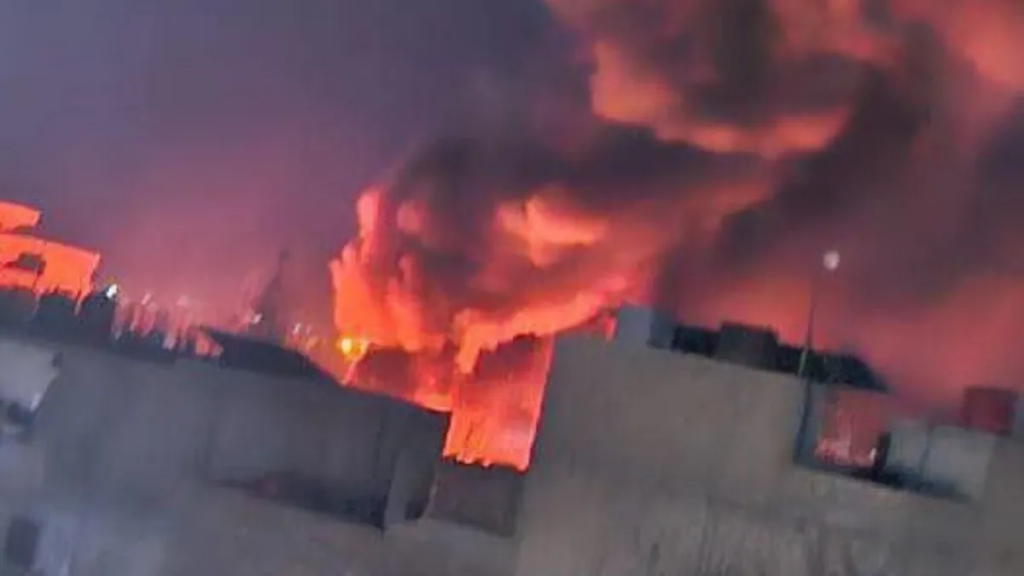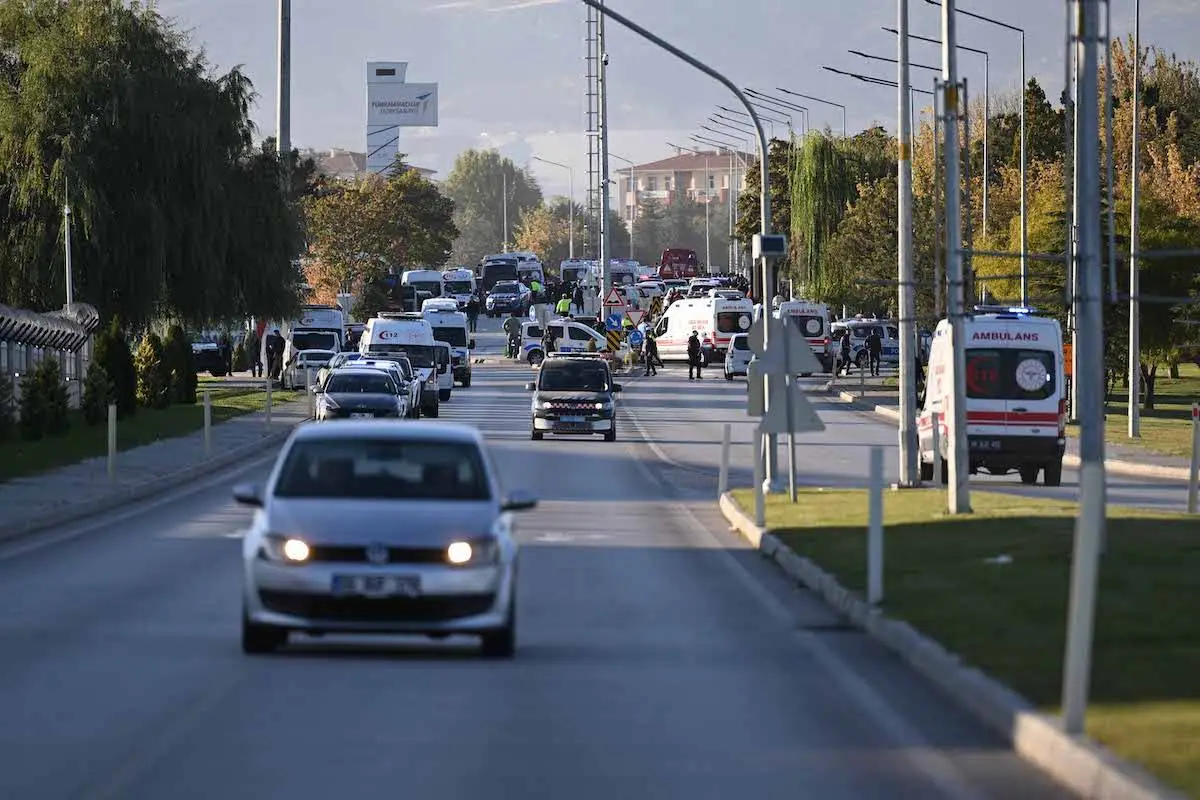On Wednesday, Turkey carried out a series of airstrikes in northern Iraq and Syria, targeting Kurdish militants in retaliation for a deadly attack on a defence company near the capital, Ankara. The strikes come at a time of heightened tensions in the region, with Turkey intensifying its long-standing battle against Kurdish forces, which it blames for the recent violence.
The attack on the Turkish Aerospace Industries (TUSAS) facility left five dead and over 20 wounded, prompting a swift and forceful response from Turkish authorities.
Retaliation and Military Response
In the aftermath of the attack on TUSAS, Turkey’s military took immediate action, launching a significant aerial offensive aimed at Kurdish groups, particularly the Kurdistan Workers’ Party (PKK) and its affiliated factions in Syria. According to the Turkish Ministry of National Defence, 47 targets were destroyed across northern Iraq and Syria, with 29 in Iraq and 18 in Syria.
Defence Minister Yasar Guler confirmed that 59 militants were “neutralised” in the operation, a term often used by Turkish officials to indicate those killed in the strikes.
Read : Israeli PM Netanyahu is Trying to Drag Iran into the War: Turkey
The PKK, which has waged an insurgency against the Turkish state for decades, is considered a terrorist organisation by Turkey, the United States, and the European Union. Its Syrian counterpart, the People’s Protection Units (YPG), forms the backbone of the Syrian Democratic Forces (SDF) — a key partner of the US-led coalition against ISIL (ISIS) in Syria.
However, Turkey views the YPG as a direct extension of the PKK, and this perceived link has long been a source of tension between Ankara and Washington.
Read : Turkey Launches Its First Homegrown Communication Satellite Turksat 6A into Orbit
The Ministry of National Defence stressed that “all kinds of precautions” were taken to avoid civilian casualties during the airstrikes. Despite these assurances, the SDF reported that 12 civilians, including two children, were killed in the attacks, and 25 others were injured.
These civilian deaths have sparked renewed concerns about the broader humanitarian impact of Turkey’s military operations in the region, especially in areas where Kurdish forces control significant swaths of territory.
The Ankara Attack: A Catalyst for Escalation
The deadly attack on TUSAS, located near Ankara, has been the latest flashpoint in Turkey’s ongoing conflict with Kurdish militants. On Wednesday, militants detonated explosives and opened fire on the defence company’s facility, which plays a key role in Turkey’s defence industry by designing and producing civilian and military aircraft, unmanned aerial vehicles (UAVs), and space systems.
The attack, which left five dead and more than 20 injured, prompted an immediate response from Turkish authorities. Interior Minister Ali Yerlikaya revealed that one of the attackers had been identified as a PKK member codenamed “Rojger,” while another assailant, a woman named Mine Sevjin Alcicek, was involved in the assault.
Turkish Defence Minister Yasar Guler vowed that the country’s forces would pursue those responsible for the attack “until the last terrorist is eliminated.”

This attack occurred shortly after a controversial statement made by Devlet Bahceli, leader of the far-right Nationalist Movement Party (MHP), suggesting that Abdullah Ocalan, the imprisoned leader of the PKK, could be granted parole if he renounced violence and dissolved his organisation.
The timing of the attack has raised questions about the potential influence of these remarks on the escalation of violence and whether this event could derail any efforts towards dialogue between the Turkish state and Kurdish groups.
The Turkish government’s response, both rhetorically and militarily, underscores the deep-seated animosity between Ankara and Kurdish militants. President Recep Tayyip Erdogan condemned the attack during a meeting with Russian President Vladimir Putin, characterising it as a “heinous terrorist attack.”
Security at the TUSAS facility was immediately heightened, with forces conducting thorough checks on vehicles and personnel entering the premises. The heightened security measures also extended to Istanbul’s main airports, with passengers being urged to arrive early due to increased screenings.
Regional Impact and Broader Implications
Turkey’s military operations in northern Iraq and Syria are part of a broader strategy to root out Kurdish militants, whom Ankara accuses of threatening its national security. For years, Turkey has conducted regular cross-border airstrikes and ground incursions against PKK bases in Iraq, particularly in the Qandil Mountains, where the group maintains a significant presence.
Similarly, Turkish forces have targeted YPG positions in Syria, most notably in the border regions of Afrin and Tal Abyad, as part of a broader effort to establish a “safe zone” along its southern border.
The recent strikes highlight Turkey’s determination to continue its military campaign against Kurdish groups, despite international concerns about the potential destabilisation of the region. The United States, while allied with the SDF in the fight against ISIL, has often found itself at odds with Turkey over its treatment of Kurdish forces.
This complex dynamic has strained relations between the two NATO allies, with Washington urging restraint in Turkey’s military actions while also relying on Kurdish fighters as a critical component in the ongoing battle against ISIL remnants.
The airstrikes also come at a time when Iraq has been working to curb the influence of the PKK within its borders. Earlier this year, Baghdad announced a ban on the PKK, a move that was welcomed by Ankara as a step towards reducing the group’s presence in northern Iraq.
However, the ability of the PKK to operate in remote and rugged areas of the region has made it difficult for Iraqi authorities to fully enforce the ban.
In Syria, the situation is equally complex. The SDF, which controls approximately a quarter of the country’s territory, including key oil fields and areas where some 900 US troops are stationed, has been a crucial partner in stabilising the region following the territorial defeat of ISIL.

However, Turkey’s military actions against the YPG have created a volatile situation, with fears that further escalation could undermine the fragile stability in northeastern Syria. The civilian casualties reported by the SDF further complicate the humanitarian situation in a region already devastated by years of conflict.
The broader implications of Turkey’s airstrikes extend beyond its immediate conflict with Kurdish militants. The ongoing violence risks exacerbating tensions between regional powers, including Iraq and Syria, both of which have expressed concerns over Turkey’s cross-border military activities.
The Iraqi embassy in Ankara condemned the attack on TUSAS and reiterated its opposition to terrorism, while also calling for respect for Iraq’s sovereignty. Similarly, Syria has long opposed Turkish military incursions into its territory, viewing them as violations of its sovereignty.
The recent events surrounding the attack on TUSAS and Turkey’s retaliatory airstrikes underscore the deep-rooted and complex nature of the conflict between the Turkish state and Kurdish militant groups. Decades of violence have left tens of thousands dead and displaced, and while there have been intermittent attempts at peace talks, the prospects for a lasting resolution remain elusive.
The pro-Kurdish Democratic Peoples’ Party (HDP), which condemned the attack on TUSAS, noted that it occurred at a time when there were renewed discussions about the possibility of dialogue to end the conflict.
However, the escalation of violence in recent days raises questions about whether there is still room for peace. Many observers fear that the cycle of attacks and retaliations will only deepen the divide between the two sides, making it increasingly difficult to find common ground.
For now, Turkey appears resolute in its pursuit of Kurdish militants, and the recent airstrikes suggest that Ankara will continue to rely on military force as its primary tool in combating the PKK and its affiliates. Whether this strategy will ultimately bring peace or further entrench the conflict remains to be seen.

